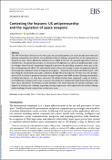Files in this item
Contesting the heavens : US antipreneurship and the regulation of space weapons
Item metadata
| dc.contributor.author | Bower, Adam S. | |
| dc.contributor.author | Lantis, Jeffrey S. | |
| dc.date.accessioned | 2023-03-09T09:30:06Z | |
| dc.date.available | 2023-03-09T09:30:06Z | |
| dc.date.issued | 2023-02-08 | |
| dc.identifier | 283658272 | |
| dc.identifier | 8a2569b7-fdcc-4119-98ab-355006a8e78d | |
| dc.identifier | 85174999122 | |
| dc.identifier.citation | Bower , A S & Lantis , J S 2023 , ' Contesting the heavens : US antipreneurship and the regulation of space weapons ' , European Journal of International Security , vol. First View . https://doi.org/10.1017/eis.2023.2 | en |
| dc.identifier.issn | 2057-5645 | |
| dc.identifier.other | ORCID: /0000-0001-5951-3407/work/130660111 | |
| dc.identifier.uri | https://hdl.handle.net/10023/27137 | |
| dc.description | Funding: Research for this article was supported by funding from The Leverhulme Trust (Research Fellowship – RF-2020-212\7). | en |
| dc.description.abstract | The 1967 Outer Space Treaty reserved outer space for ‘peaceful purposes’, yet recent decades have witnessed growing competition and calls for new multilateral rules including a proposed ban on the deployment of weapons in space. These diplomatic initiatives have stalled in the face of concerted opposition from the United States. To explain this outcome, we characterise US diplomacy as a form of ‘antipreneurship’, a type of strategic norm-focused competition designed to preserve the prevailing normative status quo in the face of entrepreneurial efforts. We substantially refine and extend existing accounts of antipreneurship by theorising three dominant forms of antipreneurial agency – rhetorical, procedural, and behavioural – and describing the mechanisms and scope conditions though which they operate. We then trace the development of US resistance to proposed restraints on space weapons from 2000–present. Drawing on hundreds of official documents, we show how successive US administrations have employed a range of interlayered diplomatic strategies and tactics to preserve the permissive international legal framework governing outer space and protect US national security priorities. Our study illustrates the specific techniques and impacts of resistance in a domain of growing strategic importance, with implications for further refining understandings of norm competition in other issue areas. | |
| dc.format.extent | 22 | |
| dc.format.extent | 328850 | |
| dc.language.iso | eng | |
| dc.relation.ispartof | European Journal of International Security | en |
| dc.subject | Antipreneurship | en |
| dc.subject | Norms | en |
| dc.subject | Outer space | en |
| dc.subject | Space security | en |
| dc.subject | Space weapons | en |
| dc.subject | United States | en |
| dc.subject | JZ International relations | en |
| dc.subject | E-NDAS | en |
| dc.subject.lcc | JZ | en |
| dc.title | Contesting the heavens : US antipreneurship and the regulation of space weapons | en |
| dc.type | Journal article | en |
| dc.contributor.sponsor | The Leverhulme Trust | en |
| dc.contributor.institution | University of St Andrews. Centre for Global Law and Governance | en |
| dc.contributor.institution | University of St Andrews. Institute of Legal and Constitutional Research | en |
| dc.contributor.institution | University of St Andrews. School of International Relations | en |
| dc.identifier.doi | 10.1017/eis.2023.2 | |
| dc.description.status | Peer reviewed | en |
| dc.identifier.grantnumber | RF-2020-212 | en |
This item appears in the following Collection(s)
Items in the St Andrews Research Repository are protected by copyright, with all rights reserved, unless otherwise indicated.

